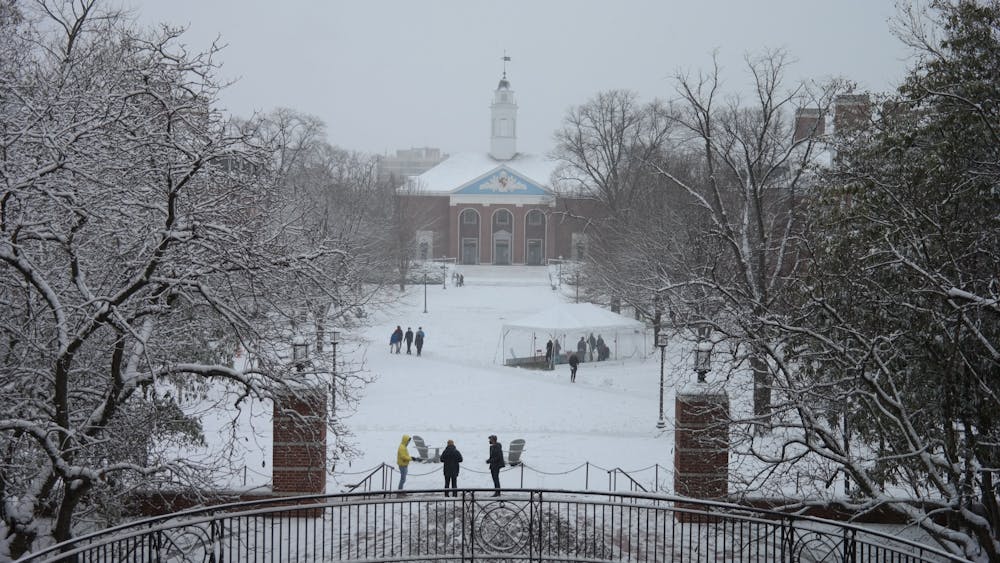The Student Government Association (SGA) discussed financial aid with Assistant Vice Provost for Financial Aid Tom McDermott at its weekly meeting on Feb 9.
According to McDermott, the Financial Aid Office received 2,400 appeals this year as opposed to its pre-pandemic average of 500. Responses took 7-10 business days, which is twice the amount of time the office anticipated. Most reasonable requests were approved, but 12% of appeals were rejected, and 20% of the appeals were “abandoned” by students, meaning that they denied pursuing the appeal or didn’t reply.
McDermott explained the University’s reasoning behind discrepancies in some students’ fall and spring aid despite their remaining at home both semesters.
“We look at the current financial aid package for the spring, and if it is based on the assumption that they would move on campus, we adjust their cost of attendance to reflect the lower cost of living at home,” he said. “That translates to a reduction to their spring financial aid. So, the amount that families are asked to pay doesn’t change; what changed is the cost of attendance.”
McDermott was also asked about University support toward student rent. According to him, $1.2 million were spent in the fall to help with rent. All students will receive help if they submit an appeal, and so far, a total of 450 students have been supported, costing $1.5 million. He added that international students in need of financial aid should submit a CSS profile to the University.
McDermott also noted that the extraordinary volume of inquiries is preventing the Financial Aid Office from being more responsive. He explained that to improve its response rates, the Financial Aid Office hired a new director of financial aid in January, Alison Rabil.
“She comes from over 30 years of financial aid experience. She is working very hard with our counseling team to develop strategies to improve our response rates, and in fact, I think we’ve already started seeing some changes over the one month she’s been here due to the changes she’s implemented,” he said.
McDermott explained that students with urgent issues should call the Financial Aid Office, which has a call center staffed from 8 a.m. to 8 p.m. Monday through Friday.
“If they can help you, they will, and if they can’t, they will go ahead and create a request to escalate your request to a financial aid advisor for a response,” he said.
He also mentioned the virtual walk-in Zoom hours, which have replaced individual appointments.
McDermott advised against emailing generic office accounts such as finaid@jhu.edu, which are inefficient, and recommended utilizing the new student service portal instead.
“The new student service portal basically captures the same information that we would over email, but we actually get students and parents to fill it out to get more detail,” he said. “It helps us make sure those requests are getting assigned to staff members who are probably best suited to give answers.”
In response to questions raised by SGA members, McDermott also provided statistics showing that the office is on track to spend $140 million this year. Of that money, $13 million is direct assistance to 2,500 students due to COVID-19. According to McDermott, 1,200 Homewood students had CARE grants from the federal financial aid. He added that a second round of grants is likely.
He emphasized that the Financial Aid Office is committed to meeting 100% of students’ needs. While they do have a budget, he said, they will fund students regardless of planned limits.
During the meeting, Freshman Class President Kobi Khong also introduced the Special Forum Amendment, which established a special forum to discuss the University’s reporting systems and Fraternity and Sorority Life culture. The forum will be an open dialogue between SGA members, invited Hopkins staff and community members and the student body.
The bill passed unanimously.
Additionally, SGA members addressed the disparity in food quality among students in isolation housing. According to the discussion, some students have complained about irregular delivery times and the lack of microwaves while others have found the service decent.
Senior Class Senator Ananya Kalahasti explained that the disparity in food quality was probably due to the difference in housing locations.
“A lot of the disparity is coming because some folks are housed at the Colonnade which is doing really comfy food options and the folks who are being housed in dorms or other non-hotel options are facing the not-great experience side. I don’t think that disparity should be happening,“ she said. “That’s definitely a conversation for us to have.”
Freshman Class Senator Elaina Regier shared her own quarantine experience at the Inn at The Colonnade Baltimore.
“It was better than it would have been in University housing, but the food was still not great and there were problems. None of us had microwaves even though we were told we would and my suitemates didn’t even have a fridge until they asked. There were limited food options, especially vegan options,” she said.
Representatives concluded that they should invite administrators from the Engagement Area to speak with SGA.
During the meeting, SGA also confirmed the members of a new vetting board for the University’s Student Conduct Ethics Board. Khong, Regier, Kalahasti, Sophomore Class Senator Karen He, Junior Class Senators Grace Wang and Subha Bhatta, Senior Class President William Cho and Senior Class Senator CiCi Zhang were all nominated. The members were confirmed unanimously.
SGA also swore in Alise Leiboff and Anish Nayak as Senior Class Senators.
Claire Goudreau contributed reporting to this article.





